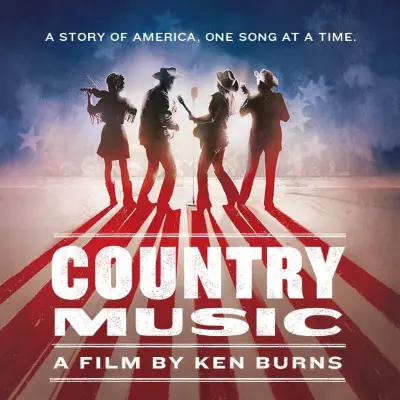Ken Burns' Country Music epic documentary works best on an emotional level, but it's short on analysis
-

"As daunting as it may seem to watch all 16 hours, the music is more than enough to carry a viewer enthusiastically along — and worth the time to do so," says Hank Stuever of Burns' new eight-part PBS documentary, premiering Sunday. "It will break you down and lift you up. The artistry will astonish and surprise you. When Rosanne Cash at last forgives her father, Johnny, for his failings, there is a remarkable sense of release." Burns deserves credit for trying to make sense of country music, which is more difficult than baseball, jazz or other topics he's tackled before. Country Music, says Stuever, "is proof that Burns’s technique can eventually and accurately convey the basic truth about any subject. Fans of the music as well as newbies will learn quite a bit in the first couple of hours." However, Stuever adds, "Burns’s resolute, objective path through country’s history is somewhat hindered by a lack of analysis. For all its gorgeous sounds, rare footage and tearful reminiscences, Country Music needs a deeper probe, one that would pursue both psychological and sociological angles. Filled to bursting with mutual praise and admiration for the artistry and entrepreneurial prowess of Nashville, it could use a few more critics and even a contrarian or two. Country Music mostly glides past the industry’s lousy inability to produce more than one legend who is also a person of color (Charley Pride is here with his pile of No. 1 hits, a miraculous exception, then Freddy Fender and then . . . precious few). But it is far better on the equally fraught subject of gender, celebrating the women of country who succeeded despite the barriers that would hold them back...And while Country Music makes a strong case for the genre’s place as an American institution, it fails to account for why — despite its enormous success and sonic ubiquity — it still isn’t regarded as the predominant music of its time. Think about it this way: When someone makes a movie or TV show about a certain era in modern American history, they still pull from the rock and pop playlist — or big-band and jazz, if earlier — unless the story is specifically about regional, country people. Otherwise, when we seek to evoke and reference the American sound, country remains on the fringe."
ALSO:
- Country Music doesn't shy away from tackling controversial aspects of the music genre: "There are moments of tension between the stories Nashville likes to tell about itself — some true, some less so — and the way things actually were.," says John Caramanica. "And while from a distance, this doggedly thorough eight-part, 16-hour series — which begins Sunday on PBS — hews to the genre’s party line, viewed up close it reveals the ruptures laid out in plain sight. Anxiety about race has been a country music constant for decades, right up through this year’s Lil Nas X kerfuffle. In positioning country music as, essentially, the music of the white rural working class, Nashville streamlined — make that steamrollered — the genre’s roots, and the ways it has always been engaged in wide-ranging cultural dialogue. But right at the beginning of Country Music is an acknowledgment that slave songs formed part of early country’s raw material....Country Music rolls its eyes at the tension between the genre imagining itself as an unvarnished platform for America’s rural storytelling and being an extremely marketable racket where people from all parts of the country, from all class levels, do a bit of cosplay...Country music, especially, demands an approach that blends reverence and skepticism, because so often its story is one in which those in control try to squelch counternarratives while never breaking a warm smile."
- Country Music is welcoming to the country-averse: "It’s a comfort. It melts barriers," says Melanie McFarland. "Aficionados will notice its imperfections and would be right to call Burns on the series’ general light touch on incredibly discomfiting chapters in country music’s history, and America’s. But never before in my life would I have predicted I’d tear up while watching Dwight Yoakam describes the crushing poetry in the lyric of a song I might not have otherwise stopped to consider."
- Country Music has such a palpable reverence for its material and charismatic characters that it almost becomes preemptively defensive: "As the docuseries itself describes in painstaking detail, country music was borne out of frustration, poured out of people who felt overlooked and under-appreciated," says Caroline Framke. "It took decades for the mainstream music industry to recognize country music’s power, and only when it was such an undeniable moneymaker that ignoring it meant losing out on potential windfalls. Country music was born with a chip on its shoulder and a stubborn adherence to 'tradition,' which Country Music spends many of its hours explaining without getting too deep into the uglier aspects of that combination. (The series ends somewhat randomly in 1996, meaning it doesn’t have to touch such modern day complications as, say, the industry excising the Dixie Chicks when they dared counter the party line on the 2003 U.S. invasion of Iraq.)"
- Ken Burns shows how country music became the soundtrack to the American dream
- Ken Burns just wanted to tell stories and not delve into politics: “We don’t have a political or another agenda. We do know that a by-product of a deep dive helps to rescue whatever the subject is from the barnacles of sentimentality that get encrusted around it.”
TOPICS: Country Music, PBS, Ken Burns, Documentaries
More Country Music on Primetimer:
